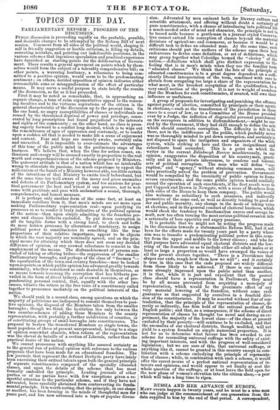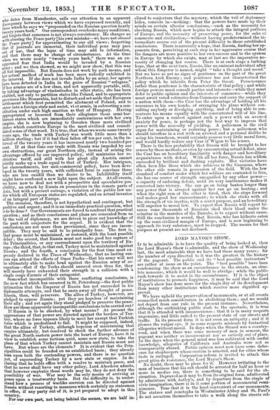RUSSIA AND HER ADVANCE ON EUROPE. MAier events happen in
twenty years, and he must be a wise man who can judge at the commencement of one generation from the who dates from Manchester, calls our attention to an apparent discrepancy between views which we have expressed recently, and those which he says we "propounded on the Russian question nearly twenty years back." Our correspondent overlooks many conditions, and forgets that sameness is not always consistency. He charges us with abusing the Peace party Ehis own mistake—we have not abused the Peace party] for approximating to our old views; forgetting that if journals are immortal, their individual pens may pass out of use, that the lapse of time may add to information, and that there may be change of circumstances. At the time when we wrote nearly "twenty years back," there was an ex- aggerated fear that India would be invaded by a Russian army ; and we then showed, as we might now show, that this was all but impossible. But Russia does not work by such means, and her actual method of work has been more nakedly exhibited in the interval. If she does not invade India by an army, her agents have been detected in India in the guise of Russian " refugees." If her armies are of a low class, and not apparently portable, still, by taking advantage of viscissitudes in other states, she has been enabled, not only to partition states like Poland, and to appropriate provinces like Bessarabia, but to disturb and set aside that European settlement which first permitted the allotment of Poland, and to enter into a foreign state and assist, vi et armis, in subverting a con- stitution under such high sanction as that of Hungary. Having appropriated or loosened from their allegiance those semi-bar- barous states which are immediately conterminous with her own empire, she is now beginning to threaten those more civilized states which constitute Europe in the most civilized and consoli- dated sense of that word. It is true, that when we wrote some twenty years ago, the trade with Turkey was worth little more than a million sterling; but if it had then fallen off ten per cent, in the in- terval of the twenty years it has increased nearly two hundred per cent. If at that time our trade with Russia was impeded by our own obstructions, our great Northern ally, instead of seizing the advantage offered by our improved policy, still maintains her re- strictive tariff, and still with her great ally Austria cannot jointly make up a trade equal to that of Turkey. Her intrigues, her encroachments, her anti-commercial policy, have been deve- loped in the twenty years, with sufficient force to convince those who are less candid than we desire to be. Infallibility itself might have confessed a new light upon the subject. At all events, we have now to deal not with a prospective and speculative pos- sibility, an attack by Russia on possessions in the remote parts of Asia, but with a present outrage, a violation of the public law un- der which all European states are regulated, and an actual invasion of an integral part of Europe. The occasion, therefore, is not hypothetical and contingent, but positive and urgent ; and it is an immediate practical question, what isto be done P Our Governments are forced to confront that practical question ; and as their conclusions and plans are concealed from us by the veil of diplomacy, we are driven to piece out knowledge of the past with conjecture for the sequel. It is evident that the conclusions are not more than provisional, since they are incom- patible. They may be said to be principally four. The first is, that peace must be maintained, or restored, with the least possible delay ; the second, that Russia must not make good her capture of the Principalities or any encroachment upon the territory of Eu- rope ; the third, that, to that end, Turkey must be maintained against Russia; and the fourth, a conclusion for the first time most ex- pressly declared in the Times of Wednesday, that no lasting sue- cess can attend the efforts of Omer Pacha—that his army will not be ultimately able to make head against the Russian army of oc- cupation—that if the Turks should succeed even thus far, they will merely have exhausted their strength in a collision with a single corps d'armee of their antagonist.
Somewhat incompatible with these conflicting conclusions, is the new fact which has occurred in St. Petersburg—the first public intimation that the Emperor of Russia has not succeeded in his diplomatic attempts, and that he casts away all thought of peace. Russia, then, will persevere. The allies of Turkey, however, are pledged to oppose Russia; yet they are hopeless of maintaining their ally ; and yet again they stand pledged to preserve the peace. How are these apparently incompatible conclusions to be carried out?
If Russia is to be checked, by what means ? At present the aggressions of that power are directed against the borders of Tur- key, where no force appears likely to meet her except that Turkish force which is predestined to fail. It might be supposed, indeed, that the allies of Turkey, although hopeless of maintaining that empire ultimately, but resolved to check the further advance of the great North-eastern power into the heart of Europe, have it in view to establish some tertium quid, some new state, to take the place of that which Turkey cannot maintain and Russia must not have. But where are the elements ? It is evident that the Prin- cipalities could be founded on no established basis ; they already lean upon both the contending powers, and there is no question yet, of superseding Turkey by a new state or empire. In de- claring that he holds office with a resolve to maintain peace, and that he never shall have any other policy, Lord Aberdeen admits, that however emphatic those words may be, they do not deny the possibility of war. War may be the only means of arriving at peace upon a trustworthy basis. But the difficulty is, to under- stand how a process of warlike coercion can be directed against Russia without resorting to measures which certainly no statesman in office, if any party out of it, is yet prepared to adopt in this country.
Forms °int part, not being behind the scenes, we are half iii.- dined to conjecture that the mystery, which the veil of diplomacy hides, consists in—nothing : that the powers have made up their minds on certain ulterior conolusions,—such as the necessity for checking Russia, which now begins to attack the integral portions of Europe, and the necessity of preserving peace, for the sake of commerce and civilization,—without having predetermined the in- termediate course out of the present difficulty to those established conclusions. There is naturally a hope, that Russia, finding her op- ponents firm, perceiving at each step in her aggressive course that the dangers are more positive to her own success and to the system in Europe by which she exists, may at last see the imperative ne- cessity of changing her course. There is at each stage a lurking hope, that at the next turn, Russia, like an eminent individual after whoni this Emperor is named, might " take a thought and mend." But we have as yet no signs of penitence on the part of the great Northern Arch Enemy ; and penitence has not characterized the policy which he inherits from Peter the Great. Perseverance rather than penitence is the characteristic of that policy ; and while foreign powers must consult parties and interests—while they must defer to public opinion and the interests of commerce—while they must await voted estimates from Commons and carry the support of a nation with them—the Czar has the advantage of holding all his resources in his own hands, of arranging his plans without con- sulting anybody or divulging anything, and of being able to con- centrate his means equally with the concentrated will of his line.. To enter upon a contest against such a power with an avowed anxiety for peace, is perhaps not the best way to impress that power with the necessity of yielding. A policeman is the civil organ for maintaining or restoring peace ; but a policeman who should interfere in a riot with an avowed and a personal dislike to using his truncheon, would certainly possess very little moral force,. and would hardly reduce any Czar of Wigan to his senses.
There is the less probability that Russia will be brought to her senses by these methods, or even by encountering actual defeat, since the Czar has an hereditary familiarity with danger and hereditary acquaintance with defeat. With all her force, Russia has seldom succeeded by brilliant and dashing exploits. Her victories have often been like those which she achieves in the Caucasus, where the other side remain in possession of the field. With the low standard of comfort under which her soldiers are contented to live, she has one source of strength unequalled by any other power7 a capacity of enduring defeat, until its very continuance makes it converted into victory. She can go on being beaten longer than any power that is arrayed against her can go on beating ; and when the right arm of the other is tired, then she steps forward and makes good her encroachment; to which she sticks with all the strength of vis inertiao, with a secret purpose, and an hereditary will superior to moral law. To expect that Russia will repent be- cause some thousands of Russians shed their blood under the scimitar in the marshes of the Danube, is to expect without cause. Still the conclusion is sound, that Russia, who has hitherto eaten up the semi-civilized margin of Europe, and is now beginning to approach its very substance, must be stopped. The means for that purpose at present are not disclosed.



































 Previous page
Previous page